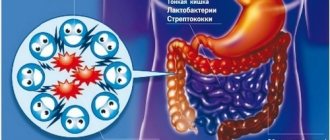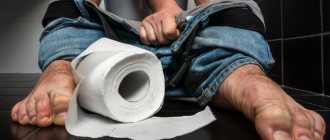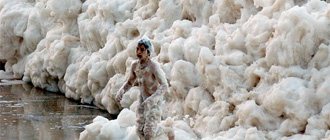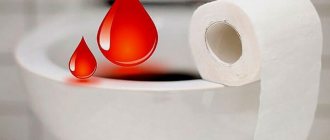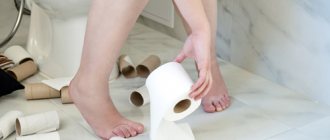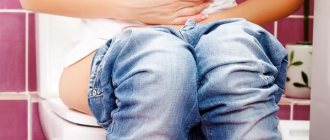Throughout his life, a person may encounter the phenomenon of water diarrhea more than once. Watery diarrhea is a condition characterized by the passage of shapeless feces.
To understand that a person has water diarrhea, you should pay attention to the presence of the following manifestations:
- acts of defecation per day reach more than three times;
- a significant increase in the total volume of bowel movements;
- noticeable discomfort in the abdomen before and after defecation;
- unformed feces
What can cause loose stools and how dangerous is it?
Among the main reasons that provoke watery diarrhea in an adult, most are caused by the actions of the victim himself.
The main factors for the development of diarrhea include:
- drinking poor quality water;
- incompatible foods in the diet;
- unwashed vegetables and fruits;
- allergic reactions to a number of products;
- poisoning with toxic substances;
- reactions to certain medications;
- pregnancy.
Separately, we can highlight some diseases against which water diarrhea may develop. Among these are:
- dysbacteriosis;
- intestinal bleeding;
- rotavirus infections;
- food digestion disorders;
- colitis;
- viral infections;
- food poisoning;
- diseases of the gastrointestinal tract;
- obstruction of the gallbladder.
Severe watery diarrhea can cause quite serious complications in humans. Since this process results in the body losing a large amount of fluid overall, it leads to dehydration.
Against this background, the following processes occur:
- blood thickening;
- water-salt imbalance;
- blood clot formation;
- violation of metabolic processes;
- Stroke and death cannot be ruled out.
In the case when water diarrhea in an adult is accompanied by pain in the abdominal area, this may indicate possible problems with the liver or pancreas.
Causes of severe diarrhea with water in an adult
Any problems with intestinal function not only cause great discomfort and ruin all plans, but also seriously harm the body.
And one of the most common pathologies is water diarrhea in an adult, treatment of which must be carried out with the obligatory elimination of the main cause of the ailment. In this case, due to the threat of dehydration, therapy must be carried out promptly. During normal functioning of the gastrointestinal tract, up to 3 acts of bowel movement occur during the day. In this case, the water level in the stool reaches 60%. Diarrhea is considered to be the phenomenon when more than 4 bowel movements occur per day.
Watery diarrhea in an adult begins when pathogenic organisms or poor-quality food enter the intestines and are not eliminated immediately.
In this case, the main danger lies not in the bacteria themselves, but in the toxins that are released with the products of their vital activity. Moreover, in contrast to the normal state, the level of water in stool during diarrhea can reach 90%.
Most often, the problem of watery stools occurs in the warm months of the year. This is explained by the extremely low activity of intestinal pathogens in winter.
Most often, the causes of such a phenomenon as water diarrhea in an adult are ignorance of the rules of personal and food hygiene. In other words, a person simply forgets about the need to thoroughly wash his hands both after going outside and having contact with animals, even domestic ones, and after visiting the toilet. In addition, proper food processing is not always observed.
But besides this, there are many more factors that provoke water diarrhea in an adult. These include:
- insufficient purification of drinking water;
- eating unwashed vegetables and fruits;
- eating very fatty foods;
- long-term adherence to mono-diet or fasting;
- suffered severe stress or prolonged psychological stress;
- indiscriminate eating of foods that are incompatible with each other;
- eating spoiled food or toxic products;
- ignoring hypersensitivity to certain foods and eating them.
Also, a similar phenomenon can occur during pregnancy, due to changes in the functioning of the entire body, and sometimes while taking medications.
However, such a phenomenon, when almost only water comes out and frequent diarrhea does not stop, may indicate the presence of serious pathologies or diseases. Most often this is:
- rotavirus intestinal infections;
- infectious lesions of the gastrointestinal tract;
- bleeding in the intestines;
- obstruction of the gallbladder;
- lack of the required amount of enzymes;
- Crohn's disease;
- flu and colds;
- chronic diseases, the main ones of which are enteritis and colitis;
- improper metabolism, in which the digestion process is disrupted.
We recommend: Causes of diarrhea with chickenpox and methods of assistance
Also among the causes of such conditions is the dangerous infectious disease cholera, which occurs due to poor hygiene. However, most often it appears in the form of epidemics in particularly contaminated areas.
Due to the fact that the pathological condition is a sign of a malfunction in the body, loose stools like water in an adult are almost always accompanied by accompanying symptoms, such as fever, nausea and vomiting. Also, one of the main additional factors for diarrhea is stomach pain and cramps. Moreover, the degree of manifestation of each additional symptom is different for different types of pathologies.
So if loose stool in an adult is accompanied by a high temperature, then the reasons for this phenomenon usually lie in food poisoning or extensive inflammatory processes. Nausea and vomiting due to diarrhea with water are a kind of protective reaction of the body and an attempt to eliminate toxins. In this case, the patient experiences a loss of strength.
When diarrhea begins like water in an adult, the pain that arises can be completely different. Most often, pain manifests itself in the area below the navel and can be accompanied by bloating, rumbling, and bursting sensations.
The threat to the patient’s health directly depends on what causes severe water diarrhea. But one of the main dangers that must be prevented as soon as possible is the problem of dehydration. In addition to the fluids themselves, diarrhea causes a loss of electrolytes that support many processes in the body, including the functioning of the brain and circulatory system.
Loose, watery stools can lead to varying degrees of dehydration:
- The initial stage of dehydration. Most often it is asymptomatic. However, in some cases it can cause headaches and slight dry mouth, as well as peeling of the lips.
- Moderate dehydration due to diarrhea with water is accompanied by thirst, a noticeable decrease in the elasticity of the skin, as well as high irritability and a feeling of increased anxiety.
- The severe stage of dehydration, as a result of severe watery diarrhea, is accompanied by extremely serious conditions. This is clouding and loss of consciousness, shock, decreased body temperature of the extremities, pale skin, rapid pulse with very low blood pressure.
It is important to understand that with such a phenomenon as water diarrhea in an adult, if treatment is not carried out on time, deep fainting and even death can occur.
Treatment
Treatment of such a condition must be carried out necessarily and as soon as possible in order to reduce harm to the body. However, few people know exactly how to act if diarrhea with water begins and what needs to be done first.
If diarrhea in adults is very frequent, then first aid is to use drugs designed to stop the removal of fluid from the body and restore its quantity. However, the treatment does not end there. In order to effectively cure diarrhea with water and prevent its negative consequences, therapy should include the following steps:
- Diarrhea is stopped with the help of sorbents or fastening agents.
- Regidron and intestinal microflora regulators are taken for quick and complete restoration of the body.
- The diet is followed for several days.
We recommend: Can you have diarrhea after eating prunes?
In addition, it is very important to drink a lot of purified or boiled water, especially when diarrhea has not yet stopped. Its daily intake for an adult with diarrhea should reach 2–2.5 liters. Moreover, if you can’t drink a glass of liquid right away, you can drink several spoons every two/three minutes.
The peculiarity of sorbents when treating diarrhea with water in an adult is their ability to quickly and effectively eliminate toxins in the body. But besides them, sorbents actively remove gases, bacteria, and viruses from the body. The most effective sorbents in the treatment of diarrhea with water in adults include the following drugs:
- Activated carbon;
- Smecta;
- Attapulgite;
- De-Nol;
- Polysorb;
- Enterosgel.
Bonding drugs, the main effect of which is to stop the urge to defecate, include the drugs Furazolidone, Loperamide and Immodium.
The use of Regidron for watery diarrhea will not only restore the acid-base balance in the body, but will also enhance the effect of sorbents and adhesives. Of course, its use must be carried out in accordance with the instructions, and use can be started as soon as diarrhea begins.
Regulators of microflora are necessary for the body affected by severe diarrhea with water, to ensure the speedy normalization of work, as well as the active elimination of remaining toxins. The main drugs among microflora regulators for watery diarrhea are:
- Bifidumbacterin;
- Acipol;
- Canadian yogurt.
The answer to the question whether it is possible to drink these drugs as soon as diarrhea begins is ambiguous. They won't do any harm. However, in this case there will be extremely little benefit from them, because if an adult has diarrhea with water, the beneficial bacteria simply will not have time to have any effect on the intestines. That is why it is better to start taking them after diarrhea has stopped.
To treat diarrhea quickly and effectively, it is very important to follow a strict diet for at least the first few days. Immediately during diarrhea with water, as well as 5–6 hours after it stops, it is better to refrain from eating. During this time, you need to drink very strong black tea with sugar, as well as a lot of good non-carbonated water.
Also, the first food to be eaten during or after diarrhea should have a fastening effect. The most suitable dishes for this are:
- rice and buckwheat porridge cooked in water;
- boiled fish;
- crackers.
We recommend: How to treat diarrhea if it occurs simultaneously with heartburn?
During the first week after diarrhea, dairy products should be avoided, as should raw vegetables. Also, in the first 2 days, it is better to make portions very small and eat 5-6 times a day. This is how you can smoothly improve the functioning of your gastrointestinal tract without overloading it after already heavy loads.
Lean boiled or baked meat, as well as baked vegetables, are best added to the diet for 2–3 days. It is recommended to postpone the consumption of fruits and dried fruits for 5-6 days, because they can not only lead to increased gas formation, but also have a relaxing effect on the intestines.
The main means of traditional medicine in the fight against diarrhea are infusions and decoctions of medicinal herbs. The main components in them are:
- Oak bark;
- Rowan;
- sage;
- caraway;
- chamomile;
- blueberry;
- St. John's wort.
To prepare an infusion for diarrhea, you need to mix 30 g of blueberries, 50 g of sage, 15 g of caraway and chamomile. From the resulting mixture, take 1 tbsp. l. and pour into 1 tbsp. boiling water Wrap the infusion and leave for 1 hour. Then strain and squeeze out the raw materials. Add boiled water to the resulting drink to make a whole glass of infusion. Take 100 ml 15 minutes before meals 4 times a day.
Another infusion effective against diarrhea with water is prepared from oak bark, rowan and St. John's wort. To prepare it, the ingredients are taken in a ratio of 3:4:3 and mixed. Add 1 tbsp to 0.5 liters of boiling water.
mixture and stir. Infuse the drink for 1 hour, then strain and drink 100 ml every 8 hours. However, due to the content of St. John's wort, it is not recommended to take the infusion for longer than 2 days.
Associated symptoms
Loose stools rarely pass without additional symptoms. The significance of concomitant symptoms lies in the fact that these signs make it possible to identify the root cause of the pathology.
Most often, diarrhea in an adult can be accompanied by nausea and vomiting. This phenomenon is quite simply explained: due to the fact that there is a disruption in the functioning of the intestines, its contents are thrown back into the stomach.
Be sure to read:
Why people's hands shake - possible diseases and treatment
Also, this symptom is often provoked by intoxication of the body, when when harmful substances are absorbed into the bloodstream, they spread throughout all systems, resulting in the formation of a gag reflex.
Additionally, water diarrhea may be accompanied by:
- pain in the abdomen. The symptom is characteristic of all types of diarrhea. However, most often it indicates the presence of pathogenic flora in the body. At the beginning, the pain is paroxysmal in nature and occurs periodically. After a lull, loose bowel movements occur;
- belching. In more frequent cases, this sign indicates an exacerbation of pathologies of the chronic form of the digestive system.
Often, watery diarrhea in an adult can be accompanied by elevated body temperature up to 39-41 degrees. This indicates the penetration of bacterial or viral flora.
Changed color of stool also indicates the presence of certain health problems:
- white - a sign of obstruction of the gallbladder due to the formation of stones or tumors;
- black – possible intestinal bleeding. In this case, emergency care is required for the patient;
- green – intoxication of the body by pathogenic flora;
- transparent - indicates indigestion;
- yellow – considered the most favorable for diarrhea. A disorder of this form can be treated independently;
- in case of blood impurities, there is a suspicion of an unfavorable course of the disease, the treatment of which will require special drug therapy.
Causes
Knowing the reason for water diarrhea is quite important. First of all, this will help to take correct measures in an emergency situation. As you know, diarrhea can occur at any time, putting a person in an awkward position.
Important! If diarrhea does not go away within three days, all medications are ineffective, you should immediately consult a doctor.
The digestive system is directly related to the work of internal organs and the external environment, which is why it is most susceptible to disease. Any irritation or disruption of body functions leads to increased motor activity, then the release of mucus, and then to diarrhea.
- Dyspeptic. The most common cause of diarrhea is water. It occurs due to a disrupted regulatory system of the gastric glands, the lack of the body’s ability to absorb and digest food.
- Infectious. This factor is characterized by the presence of intestinal viruses, food toxins and dysentery.
- Nutritional. The body's reaction to the allergen content in the food consumed.
- Toxic. Poisoning with poisons and toxins (arsenic, mercury).
- Medication. Negative effects of medications. For example, antibiotics, along with harmful bacteria, also kill vital bacteria for the human body.
- Neurogenic. “Bear disease” is the second name for the disease and also the cause of watery diarrhea. It is caused by fears, stress, anxiety and emotional distress.
There are other causes of diarrhea in an adult. Malaise may be accompanied by various symptoms. If you also have a fever during diarrhea with water, it is most likely intoxication of the whole body. Diarrhea can also be a manifestation of other diseases (pancreatitis, hepatitis, appendicitis). Diarrhea is a symptom of these diseases if the patient complains of abdominal pain.
Diagnosis
To make a correct diagnosis, the following methods are used:
- stool analysis for worms and occult blood, as well as dysbacteriosis;
- caprocytogram;
- bacteriological examination of feces;
- irrigoscopy;
- blood analysis;
- Ultrasound of the abdominal cavity and pelvic organs.
To exclude diseases of the large intestine, sigmoidoscopy and colonoscopy are used.
Doctors talk about the reasons for constant diarrhea, watch the video:
How to make a proper diet
Severe diarrhea with water, what to do first? If you have diarrhea with water, you must follow a diet. First of all, exclude baked goods and pasta, sweets, carbonated drinks, fatty meats and fish. You should also avoid canned and pickled foods. Food should be steamed, boiled or baked.
Important! Do not break your diet under any circumstances! Its goal is not only prevention, but also treatment of the disease.
Sample menu for water diarrhea in adults:
- breakfast (steamed omelette, tea with crackers);
- snack (biscuits, apple juice diluted with water 1:1);
- lunch (soup with vegetables in light meat broth, steamed chicken meatballs, jelly);
- afternoon snack (baked apple and biscuits);
- dinner (buckwheat porridge, boiled chicken breast, rosehip infusion);
- second dinner (chamomile infusion and crackers).
Treatment
After a thorough examination and confirmation of the diagnosis, first of all, before starting to take prescribed medications, it is necessary to restore the water-salt balance.
For this purpose, a drug such as Regidron is used. The powder is pre-diluted with water. It is important that this drug is taken within the first 6-10 hours.
The dosage will depend on how much weight the patient has lost. If you lose half a kilogram, you need to drink at least a liter of the resulting solution.
There is no need to consume any more liquid. Only after this procedure can you begin introducing other liquids.
Be sure to read:
Effective treatment for insomnia at home
Non-carbonated mineral water, for example Essentuki No. 4, will be no less effective.
Medications
When choosing medications used in the treatment of diarrhea with water, it is necessary to proceed from the reasons that provoked this disease.
As a rule, medications of the following groups can be prescribed:
- probiotics;
- antibiotics;
- aimed at inhibiting intestinal motility;
- enterosorbents.
Among the most commonly used medications are the following:
- Smecta. Refers to antidiarrheal drugs of natural origin. Its effect is aimed at stabilizing the mucous barrier, increasing the quality and quantity of mucus in the intestines. Contraindications include individual intolerance, intestinal obstruction and lack of sucrase-isolmatase in the body;
- Bifidumbacterin. Belongs to the group of probiotics, regulates microflora in the intestines. Due to the increased content of bifidobacteria, the drug quickly restores the intestinal microflora. Used to treat loose stools caused by acute intestinal infections, food poisoning and dysbacteriosis;
- Enterofuril. An antimicrobial drug used for gastrointestinal infections. It is recommended to use for infectious diarrhea without helminthic infestation;
- Loperamide. The effect of this drug is aimed mainly at reducing the tone and motility of intestinal smooth muscles. In addition, taking the drug increases the tone of the anal sphincter, which helps retain feces and reduce the frequency of the urge to defecate.
Special diet
To treat watery diarrhea in an adult, diet is no less important.
Many products have a strengthening effect, which promotes faster recovery, while others, on the contrary, have a laxative effect, which significantly worsens the condition.
Products prohibited for consumption for diarrhea include:
- offal;
- fatty meat broths;
- eggs in any form;
- canned vegetables;
- grilled meat;
- fatty fish;
- sour fruits and berries;
- bread and any pastries;
- carbonated drinks.
Allowed for use:
- steamed cutlets;
- puree, even baby puree;
- low-fat boiled fish or steamed fish cutlets;
- only boiled pasta;
- cottage cheese and fermented milk products;
- baked or boiled vegetables, such as pumpkin, potatoes. Zucchini;
- omelette;
- fruit mousses;
- mineral water, compotes and green tea.
It is necessary to adhere to the diet until complete recovery.
Diseases of the spleen: symptoms and treatment methods.
Read this article on how to treat chronic cholecystitis.
Reflux esophagitis, how to treat?
Consequences
What to do if you suddenly catch water diarrhea in an adult? Treatment must be urgent. Especially if the patient has vomiting and diarrhea with water. Such manifestations can lead to dehydration.
The human skeleton is made up of 15–20% water, while the heart and brain are 76%. From this we can conclude: how important water is to the human body. All organs can be affected by deficiency.
In addition, minerals are also lost with diarrhea. With loose stools more than 3 times a day, the water-salt balance is disturbed. If treatment is not started in a timely manner, recovery will require significantly more time, especially for older people.
Treatment with folk remedies
In addition to medicinal treatment of diarrhea with water, you can use some proven traditional medicine recipes:
- Tea. A fairly strong brew of black or green tea is made. You need to use it at least three times a day. You can also simply chew dry tea leaves;
- Rice water. A fairly effective remedy, the result of which is noticeable already on the second or third day. To prepare, you will need a glass of rice and seven cups of water. You need to simmer over low heat. Afterwards, the broth is cooled and taken warm in 1/3 of a glass at intervals of two hours. Before use, the resulting mixture must be strained;
- Willow bark. Take 10 grams of the dry mixture and add 200 milliliters of boiled water. The mixture must be boiled over low heat for 20 minutes. Then cool and pass through a sieve to clean. It is recommended to take half a glass up to 4 times a day;
- Pear. Dried fruits in the amount of 2 tablespoons are poured with a glass of boiled water, covered with a lid and infused for about six hours. It is recommended to drink 50 milliliters 15 minutes before meals;
- Sunflower seeds. You will need a glass of fried seeds, which are poured only with boiling water. After this, the mixture is cooked over a fire until the volume is reduced by half. Before use, the decoction must be filtered;
- Pomegranate peel. Two tablespoons are poured into a glass of water and put on fire for 30 minutes. Then the infusion is filtered and taken twenty minutes before meals, 2 tablespoons each;
- Lemon juice. Helps stop vomiting and diarrhea. To use, you need to dilute one spoon in a glass of warm water.
Be sure to read:
Why your throat hurts and it hurts to swallow - treatment with folk remedies
Whatever methods of treating diarrhea with water are used, the main thing to remember is that any of them will have a positive effect if diarrhea does not exacerbate the patient’s condition, which is accompanied by severe pain in the abdomen, fever, and weakness.
If you have any symptom that makes you wary, you should immediately consult a doctor and not self-medicate, which in such situations can be life-threatening.
Symptoms
To determine a specific problem, it is necessary to take into account the signs and characteristics of the disease. In the case of watery diarrhea, the distinctive features are expressed in the nature of the flow and color of liquid feces.
Diarrhea can be accompanied by a temperature from 37 to 39°. What is considered normal in principle, its absence is worse; this indicates immunodeficiency. Nausea is the most common symptom of the disease, which subsequently causes vomiting. A feeling of heaviness and pain in the abdomen are also characteristic. Against the background of diarrhea, one almost always notices the belching of rotten eggs, which is present due to the release of gases from the gastrointestinal tract.
A specialist can easily determine the cause by the color of the stool.
- Green stool indicates the presence of bacteria and viruses in the intestines.
- Diarrhea with yellow water occurs due to increased peristalsis (the most favorable sign and cause for the patient).
- Black feces can be caused by eating beets, blueberries and activated carbon - in the best case. If none of the above was taken in food, then this is a serious “bell” of the body, which is a symptom of bleeding from the stomach.
- White diarrhea means there is a tumor or stone in the bile duct.
- With watery transparent diarrhea, one can assume cholera, which, when entering the body, provokes all the mechanisms of diarrhea.
Why is it dangerous?
The most significant threat that adult stool poses to a person is dehydration.
With diarrhea, water and electrolytes are very quickly removed from the body in feces. In the absence of replacement of lost elements, dehydration develops, which is divided into 3 degrees:
- early dehydration, which is asymptomatic;
- moderate dehydration, which is accompanied by a feeling of thirst, irritability and anxiety, decreased elasticity of the skin;
- severe dehydration, the symptoms of which include more severe conditions such as confusion, shock, prolonged absence of urination, cold extremities, increased heart rate, pale skin and low or undetectable blood pressure.
If emergency measures are not taken to replace fluid in the body, severe dehydration can be fatal.
If any signs of dehydration appear, seek immediate medical attention!
Measures to help the patient
Emergency primary care measures consist of restoring the volume of lost fluid, taming attacks of uncontrolled bowel movements, relieving inflammation, and restoring digestive and motor functions.
Treatment of watery diarrhea in adults begins with eliminating dehydration and restoring electrolyte balance. Invaluable help with severe diarrhea in an adult will be provided by slightly mineralized water without gas, containing potassium and sodium ions. These elements will restore osmotic pressure in the tissues. Doctors recommend drinking mineral water heated to 35-42 °C; cold water will loosen the intestines.
You can prepare a rehydrant for severe diarrhea yourself: dissolve 15 g of sugar (3 level teaspoons), 5 g of sodium chloride (teaspoon) and 2 g of sodium bicarbonate in 1 liter of boiled warm water.
Stopping diarrhea
Loperamide-based medications will quickly and effectively stop watery diarrhea. Medicines containing this active substance are sold under the trade names Imodium, Diara, Vero-Loperamide, Lopedium, Loperamide-Acri, Superilop, Loperamide hydrochloride. The main dosage form is presented in the form of chewable strips and tablets for rapid dissolution in the oral cavity. Loperamide acts in the following areas:
- inhibits intestinal peristalsis;
- tones the muscles of the anal ring to retain feces;
- stops the release of water and electrolytes by the intestinal wall.
However, medications eliminate the manifestations of watery diarrhea only if it is not caused by ulcerative colitis, pseudomembranous colitis, or antibiotic-associated diarrhea. Contraindications also include intestinal obstruction, the presence of diverticula, bloody stools, children under 6 years of age, pregnancy and breastfeeding.
Astringents
The drugs Tansal, Allylsat, Bevisal, Mexaza have an astringent, anti-inflammatory, and antimicrobial effect. After swallowing, the tablets pass through the stomach and gradually dissolve in the intestines, forming a film of compacted proteins. The intestinal walls become impenetrable to mediators of pathological reactions, and the release of water is inhibited.
Plant-based medicines are widely available on the market and are inexpensive; they have proven effectiveness due to the content of tannins. The most popular of them:
- St. John's wort briquettes;
- alder fruit or alder cones;
- aqueous extract of plantain leaves in granules;
- chamomile flowers;
- grass with the roots of marsh cudweed.
Adherents of traditional medicine use those recipes that have come down to us in a “combed” form and have received the approval of official science. Collections of medicinal herbs have a studied composition and a proven effect of each component for a specific disease. However, our ancestors used the services of healers and herbalists due to the lack of an alternative in the form of modern medicine with its achievements.
If external wounds and cuts were treated with bandages and poultices with antiseptic herbs, then regarding the internal organs of the human body, “people's doctors” were in deep ignorance. Internal diseases had to be treated with potions made from strange ingredients, accompanied by incantations and spells.
Here are some folk remedies for watery diarrhea, quoted “uncut” from an ancient medical book:
- Dissolve powdered dog droppings in urine and drop a hot river cobblestone into it. Give to drink 2 times for 3 days.
- Inflammation of the intestines is cured by goat droppings, dried, ground into powder and applied to the stomach.
- The high temperature was brought down by going to the forest, to the aspen tree. They bowed to the tree and said: “Aspen, aspen, take my quagmire, give me relief!” After which they tied the aspen with their belt.
- If there is no forest nearby, you can go to the river with a handful of millet clutched in your fist. They stand with their backs to the river and chant: “Fever, there are seventy-seven of you, ours to you all.” With these words they throw the millet over their heads.
- For those who do not keep cleanliness in the house or yard, who place their droppings anywhere and the person is unknown, a terrible punishment has been invented. They take hot coals from the stove and pour them on the droppings. They are waiting for the slut's seat to become scalded.
Now such treatment methods will cause a bewildered smile, but once upon a time people believed in them and took them for granted. Thanks to modern “chemistry” - antibiotics, vaccines, analgesics, antipyretics, antispasmodics and other effective medications, we have the opportunity to live happily ever after.
A special diet is designed to reduce the load on the digestive system, the accuracy of which determines the speed of recovery. Allowed foods:
- cereals – semolina, oatmeal, rice, buckwheat. They are used to cook liquid porridges in water or low-fat half-and-half milk. Season with sugar, salt, 5 g of butter per 200 g serving;
- meat – chicken breast, turkey, rabbit, beef. Boil, stew, bake. Served with a side dish of vegetables, cereals, and boiled pasta. Steam cutlets and other minced meat products are prepared;
- lean fish, baked in foil with vegetables, stewed;
- vegetables - potatoes, carrots, zucchini, pumpkin, boiled, mashed. It is good to include vegetable puree soups in your diet;
- hard-boiled eggs;
- fruits – baked, mashed apples remove toxins due to their high pectin content;
- bread – homemade white croutons, biscuits;
- drinks – tea, water, still mineral water, rosehip decoction.
Products prohibited during treatment:
- raw fruits and vegetables, rich in fiber and causing increased gas formation, especially cabbage of all varieties, pears, grapes, apricots;
- products with high levels of chemical additives, hot spices, vinegar, salt, smoking liquid, preservatives;
- exclude from the menu fatty fried foods, deep-fried potatoes, chicken wings, donuts;
- dairy and fermented milk products are poorly digested and irritate the intestines.
Prevention
Dangerous microorganisms are especially active during the warm period. Before eating, wash fresh fruits, berries and vegetables thoroughly and then pour boiling water over them.
- Maintain good hand hygiene: wash with soap before eating, after going outside, shopping and using the toilet.
- Even after you decide to count your cash savings, don’t forget to wash your hands.
- Make sure that all products undergo thorough heat treatment and are well fried, stewed and finished cooking. Do not eat expired products.
- Raw food should never be stored together with cooked food. You should not eat in dubious establishments (cafes, snack bars and restaurants).
Drink high-quality water or boil it for more time. This kind of trouble often catches people who love to travel. When traveling abroad, also do not forget about hygiene rules.
source: www.lechim-prosto.ru
Diarrhea is an extremely unpleasant problem that usually strikes at the most inopportune moment. Although water diarrhea in an adult does not require special treatment, no one wants to wait until the problem goes away on its own. There are quite a lot of methods to combat diarrhea, and it will not be superfluous to get acquainted with them.
What can cause water diarrhea in an adult?
Diarrhea or, more simply put, diarrhea is a phenomenon familiar to many. More often than others, this problem is encountered by children who follow basic hygiene rules every now and then. Although adults treat hygiene standards more responsibly, not everyone can protect themselves from diarrhea. Therefore, almost everyone has to suffer from frequent runs to the toilet and extremely unpleasant abdominal pain from time to time.
Diarrhea in the form of water can appear for various reasons:
- Some people suffer from stomach upsets due to stress.
- Even one unwashed and hastily eaten apple (or any other fruit) can cause diarrhea.
- We must not forget about infectious bacilli, which most often multiply in untreated water.
- Very often, diarrhea appears as a negative reaction of the body to taking potent drugs: antibiotics, cyostatics, prokinetics and, paradoxically as it may sound, laxatives.
- Dysbacteriosis can also manifest itself as diarrhea.
Regardless of what caused it, diarrhea causes many problems and harms the body.
What to do if diarrhea is like water?
As is the case with most other diseases, it is strictly not recommended to start fighting diarrhea without understanding the cause of the problem. It turns out that the first thing you need to do when you have water diarrhea is to determine what caused the diarrhea. Usually this is not a difficult task - you will probably remember how, in a hurry, you drank a glass of untreated water or, having decided to remember your childhood, you ate an unwashed apricot straight from the tree.
In most cases, diarrhea goes away on its own within a day or two. Even doctors do not advise doing anything special at this time. All you can do is drink more water (diarrhea greatly dehydrates the body) and follow a gentle diet. If you have diarrhea, you should not eat heavy or fried foods; alcohol, fast food, fresh fruits and vegetables are strictly prohibited. The following products will help treat diarrhea with water in an adult:
- dried bread;
- dairy products;
- porridge;
- dried fruits and berries;
- baked apples;
- lean boiled meat;
- jelly.
You shouldn’t forcefully eat if you have diarrhea like water. The main thing is to drink, and you can recover and recharge your body with energy even after recovery.
Of the medications, only harmless sorbents are allowed, such as activated carbon or calcium gluconate. Some people find help such as:
- Smecta;
- Enterosgel;
- Atoxyl.
It is not advisable to stop taking these medications until complete recovery.
If diarrhea like water in an adult continues for a long time (three or more days), while the patient suffers from fever, sudden weight loss and bloody discharge, it is better to seek qualified help. Most likely, the cause is a serious infection, and therefore appropriate treatment is required - with antibiotics, probiotics, anti-inflammatory, antifungal drugs and enzymes.
Some methods of treating diarrhea with water are also available in folk medicine:
- Oak bark tincture helps with diarrhea.
- Chamomile decoction promotes a speedy recovery.
- Adherents of traditional methods of treatment recommend eating bird cherry fruits for diarrhea.
- A good remedy is peppercorns.
source: WomanAdvice.ru
During normal functioning of the body, a person excretes an average of 150-300 g of feces every 24 hours. The amount of feces depends on the food consumed and the amount of coarse dietary fiber in it. The frequency of bowel movements is individual for each person, but if visiting the toilet exceeds 3 times a day, we can safely say that the person has developed diarrhea. During “normal” operation of the digestive system, the amount of liquid in the stool is no more than 60%, and the person does not experience any discomfort. If the functioning of the gastrointestinal tract is disrupted, then up to 90% of fluid in the stool can be observed. In this case we are talking about watery diarrhea.
What causes prolonged diarrhea with water?
In case of dehydration with long-term diarrhea for more than three days, the consequences can lead to the development of:
- Inflammation in the intestinal walls during infection with rotavirus, invasions;
- Cancerous tumors;
- Hepatitis C.
Prolonged, severe diarrhea with water leads to dehydration. After all, along with watery feces, frequent bowel movements remove not only harmful substances, but also salts and electrolytes needed by the body. This is accompanied by deterioration of the condition:
- severe dry mouth with constant thirst;
- dryness and paleness of the skin;
- rare weak urination with dark urine or lack of urge to urinate, discomfort in the lower abdomen;
- nausea, vomiting;
- loss of strength, apathy, weakness;
- increased body temperature, chills, fever;
- irritability, panic states.
All of these symptoms may not necessarily be present at the same time. Much depends on the causes, duration, and intensity of diarrhea. However, if the problem cannot be eliminated, dehydration will worsen, which can lead to fatal consequences. Already on the second day of dehydration, confusion is observed, a person’s inability to think sensibly and lead a normal lifestyle.
What is watery diarrhea?
Watery diarrhea (like water) is a condition characterized by the body's excretion of shapeless, pale-colored stool.
During bowel movements, burning and itching of the anus, as well as a feeling of incomplete emptying of the intestines, are often noted.
You can understand that in a particular case we are talking about watery diarrhea by the following characteristics:
- the number of acts of defecation per day exceeds 3 times;
- the total volume of bowel movements increases significantly;
- during the act of defecation and after it, the patient notes discomfort in the abdomen;
- stool is not formed, the color is different from normal (as a rule, the color of stool becomes light brown or yellow).
